API3
API3 is a collaborative project to deliver traditional API services to smart contract platforms in a decentralized and trust-minimized way. It is governed by a decentralized autonomous organization (DAO), the API3 DAO.
Read more about how The API3 DAO works. Click here
Airnode
Developers can use Airnode to request offchain data inside their smart contracts on Linea. An Airnode is a first-party oracle that pushes offchain API data to your onchain contract. Airnode lets API providers easily run their own first-party oracle nodes. That way, they can provide data to any onchain dapp that's interested in their services, all without an intermediary.
An onchain smart contract makes a request in the RRP (Request Response
Protocol) contract
(AirnodeRrpV0.sol) that adds the request to the event logs. The Airnode then
accesses the event logs, fetches the API data and performs a callback to the
requester with the requested data.
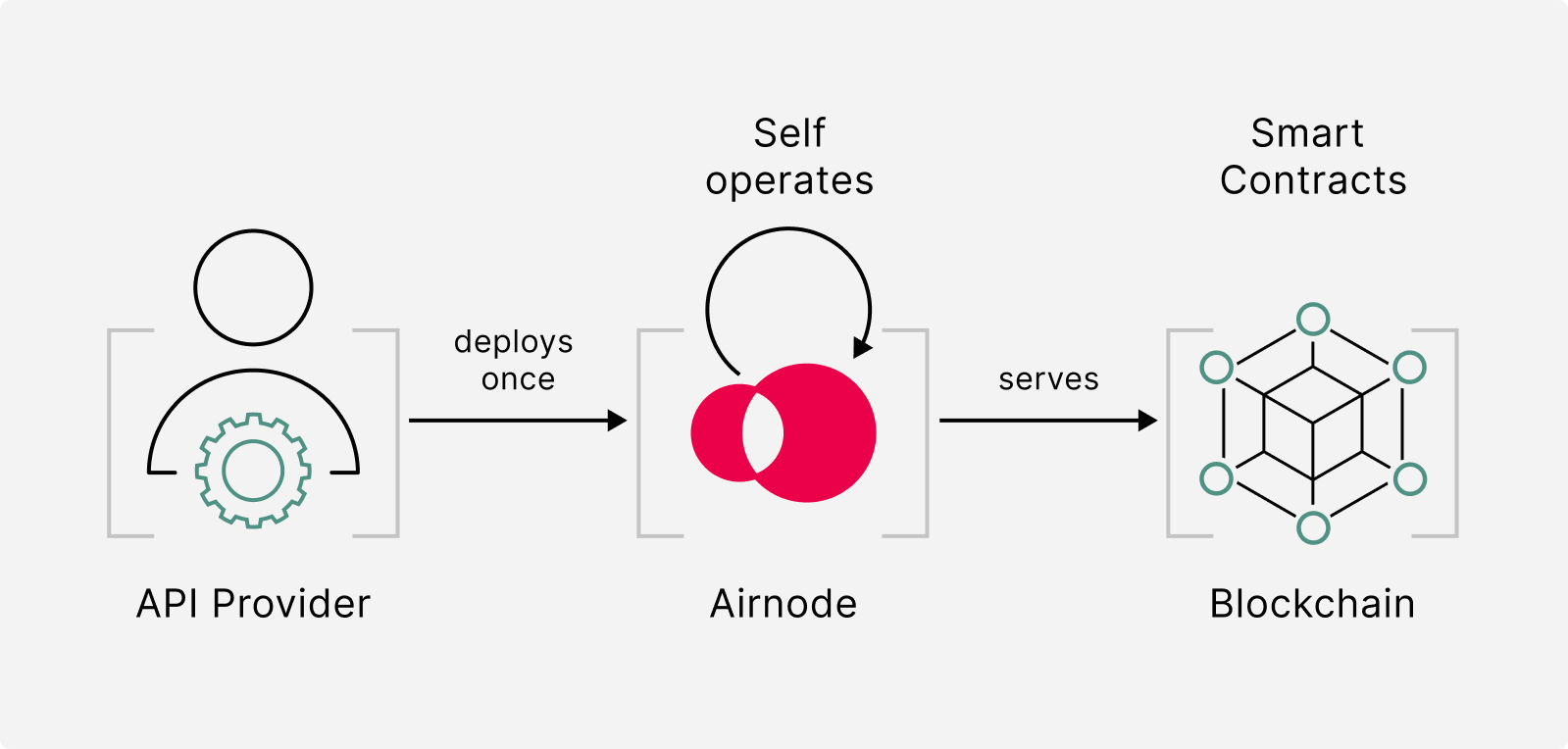
Request offchain data by calling an Airnode
Requesting offchain data essentially involves triggering an Airnode and getting its response through your smart contract. The smart contract in this case would be the requester contract, which will make a request to the desired offchain Airnode and then capture its response.
The requester calling an Airnode primarily focuses on two tasks:
- Make the request
- Accept and decode the response
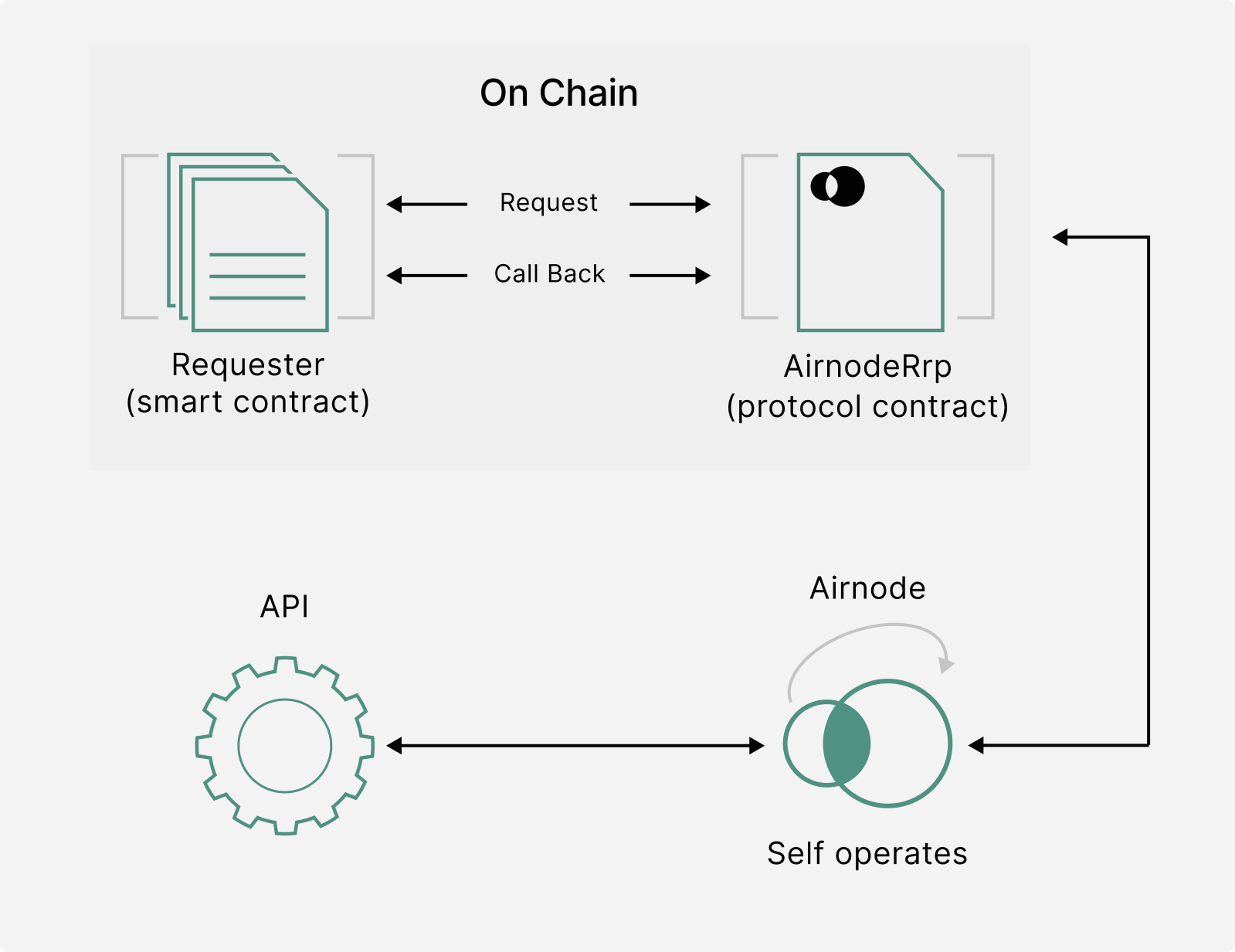
Here is an example of a basic requester contract to request data from an Airnode:
// SPDX-License-Identifier: MIT
pragma solidity 0.8.9;
import "@api3/airnode-protocol/contracts/rrp/requesters/RrpRequesterV0.sol";
import "@openzeppelin/contracts@4.9.5/access/Ownable.sol";
// A Requester that will return the requested data by calling the specified Airnode.
contract Requester is RrpRequesterV0, Ownable {
mapping(bytes32 => bool) public incomingFulfillments;
mapping(bytes32 => int256) public fulfilledData;
// Make sure you specify the right _rrpAddress for your chain while deploying the contract.
constructor(address _rrpAddress) RrpRequesterV0(_rrpAddress) {}
// To receive funds from the sponsor wallet and send them to the owner.
receive() external payable {
payable(owner()).transfer(address(this).balance);
}
// The main makeRequest function that will trigger the Airnode request.
function makeRequest(
address airnode,
bytes32 endpointId,
address sponsor,
address sponsorWallet,
bytes calldata parameters
) external {
bytes32 requestId = airnodeRrp.makeFullRequest(
airnode, // airnode address
endpointId, // endpointId
sponsor, // sponsor's address
sponsorWallet, // sponsorWallet
address(this), // fulfillAddress
this.fulfill.selector, // fulfillFunctionId
parameters // encoded API parameters
);
incomingFulfillments[requestId] = true;
}
function fulfill(bytes32 requestId, bytes calldata data)
external
onlyAirnodeRrp
{
require(incomingFulfillments[requestId], "No such request made");
delete incomingFulfillments[requestId];
int256 decodedData = abi.decode(data, (int256));
fulfilledData[requestId] = decodedData;
}
// To withdraw funds from the sponsor wallet to the contract.
function withdraw(address airnode, address sponsorWallet) external onlyOwner {
airnodeRrp.requestWithdrawal(
airnode,
sponsorWallet
);
}
}
The _rrpAddress is the main airnodeRrpAddress. The RRP Contracts have
already been deployed onchain. You can also try deploying it on Remix
| Contract | Addresses |
|---|---|
| AirnodeRrpV0 | 0xa0AD79D995DdeeB18a14eAef56A549A04e3Aa1Bd |
Request parameters
The makeRequest() function expects the following parameters to make a valid
request.
airnode: Specifies the Airnode Address.endpointId: Specifies the endpoint to be used.sponsorandsponsorWallet: Specifies the wallet that will be used to fulfill the request.parameters: Specifies the API and Reserved Parameters (see Airnode ABI specifications for how these are encoded). Parameters can be encoded offchain using@airnode-abilibrary.
Response parameters
The callback to the Requester contains two parameters:
requestId: First acquired when making the request and passed here as a reference to identify the request for which the response is intended.data: In case of a successful response, this is the requested data which has been encoded and contains a timestamp in addition to other response data. Decode it using thedecode()function from theabiobject.
Sponsors should not fund a sponsorWallet with more than they can trust the
Airnode with, as the Airnode controls the private key to the sponsorWallet.
The deployer of such Airnode undertakes no custody obligations, and the risk of
loss or misuse of any excess funds sent to the sponsorWallet remains with the
sponsor.
Using dAPIs - API3 datafeeds
dAPIs are continuously updated streams of offchain data, such as the latest cryptocurrency, stock and commodity prices. They can power various decentralized applications such as DeFi lending, synthetic assets, stablecoins, derivatives, NFTs and more.
The data feeds are continuously updated by first-party oracles using signed data. Dapp owners can read the onchain value of any dAPI in real-time.
Due to being composed of first-party data feeds, dAPIs offer security, transparency, cost-efficiency and scalability in a turn-key package.
Apart from relying on deviation threshold and heartbeat configuration updates, unlike traditional data feeds, OEV Network enables dapps using dAPIs to auction off the right to update the data feeds to searcher bots. Searcher bots can bid for price updates through the OEV Network to update the data feeds. All the OEV proceeds go back to the dapp.
The API3 Market enables users to connect to a dAPI and access the associated data feed services.
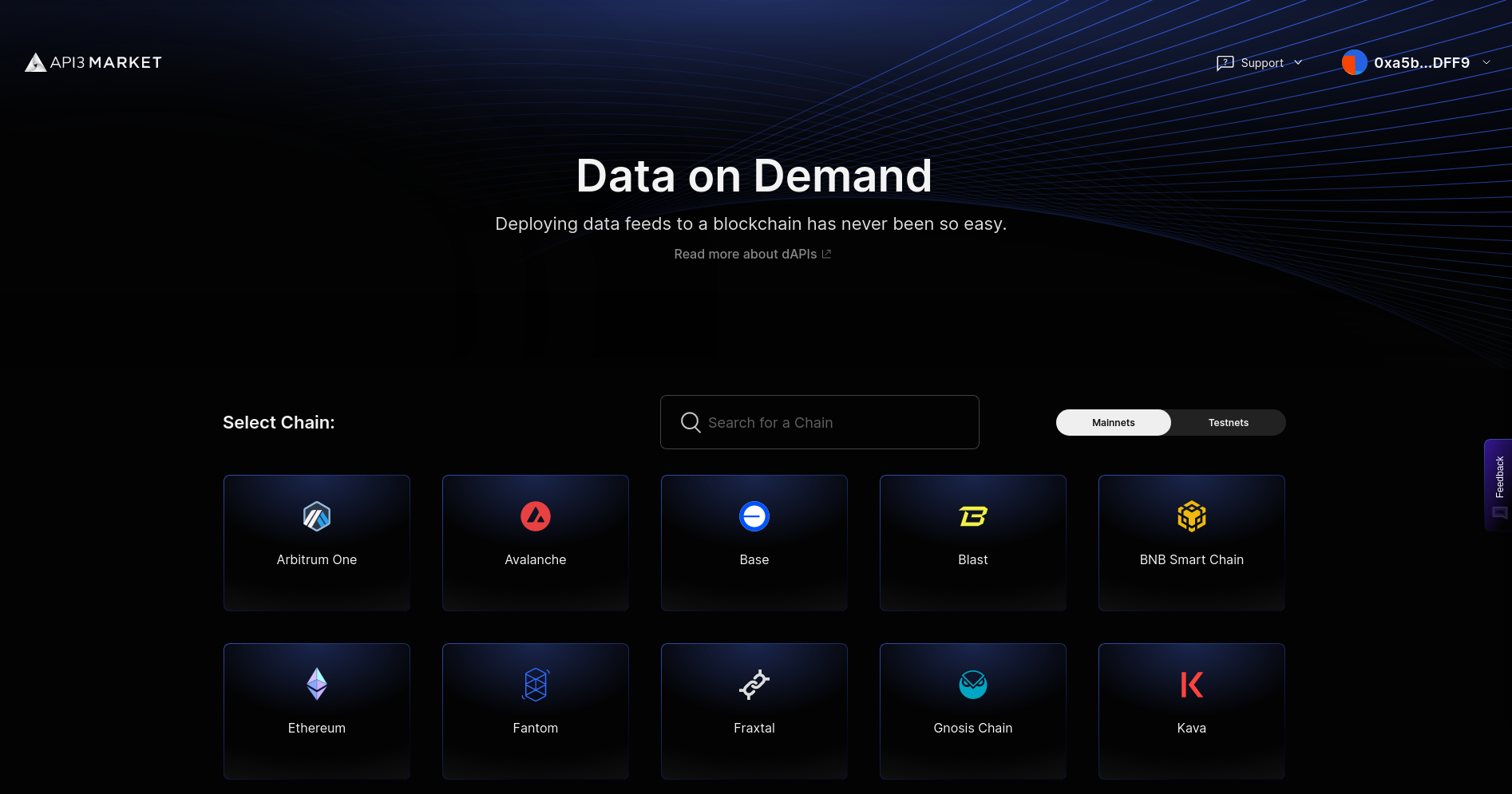
Learn more about how dAPIs work.
Subscribe to dAPIs
The API3 Market lets users access dAPIs on both Linea Mainnet and testnet.
Explore, select and configure your dAPI
The API3 Market provides a list of all the dAPIs available across multiple chains including testnets. You can filter the list by mainnet or testnet chains. After selecting the chain, you can search for a specific dAPI by name. Once selected, you will land on the details page (eg ETH/USD on Linea Testnet) where you can find more information about the dAPI.
The current supported configurations for dAPIs are:
| Deviation | Heartbeat |
|---|---|
| 0.25% | 24 hours |
| 0.5% | 24 hours |
| 1% | 24 hours |
| 5% | 24 hours |
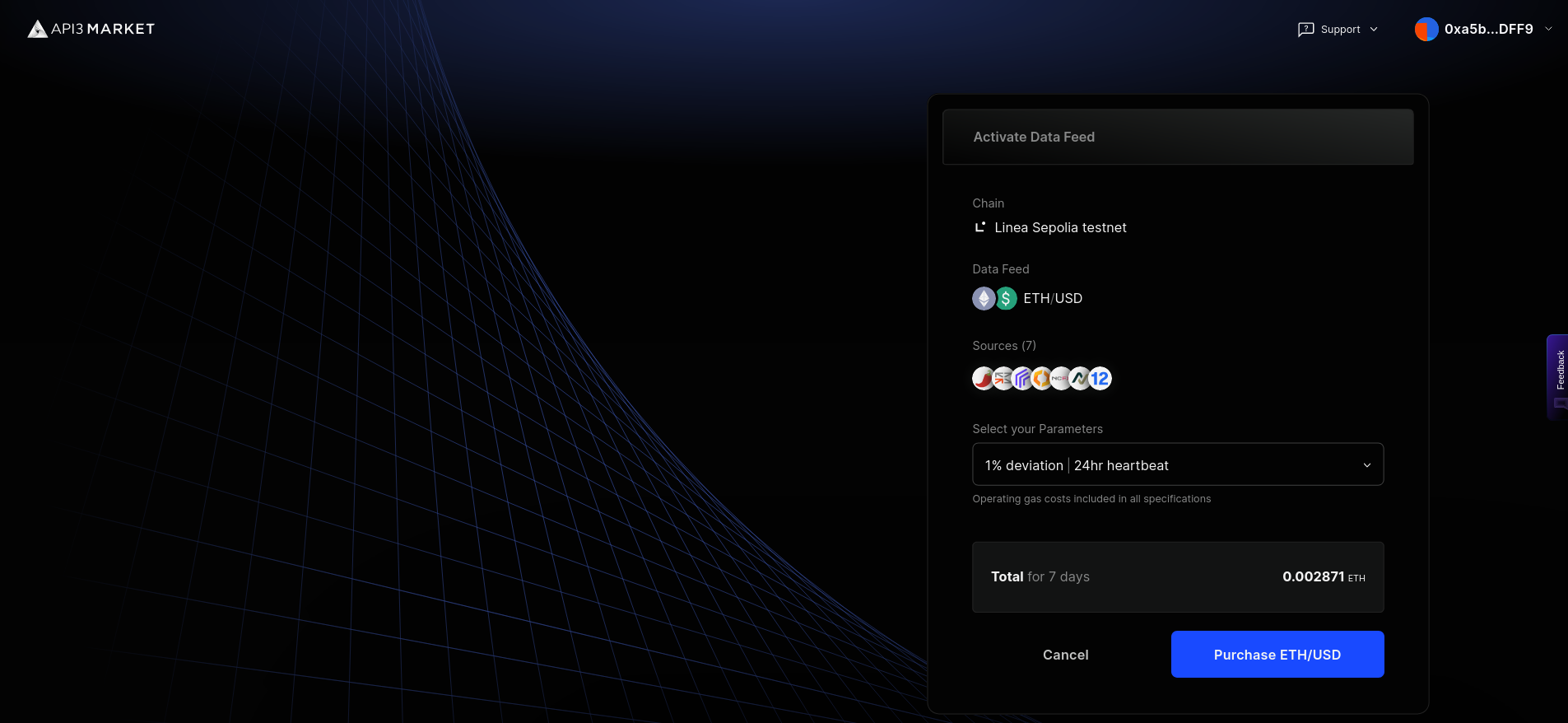
Activate your dAPI
If a dAPI is already activated, make sure to check the expiration date and update parameters. You can update the parameters and extend the subscription by purchasing a new configuration.
After selecting the dAPI and the configuration, you will be presented with an option to purchase the dAPI and activate it. Make sure to check the time and amount of the subscription. If everything looks good, click "Purchase".
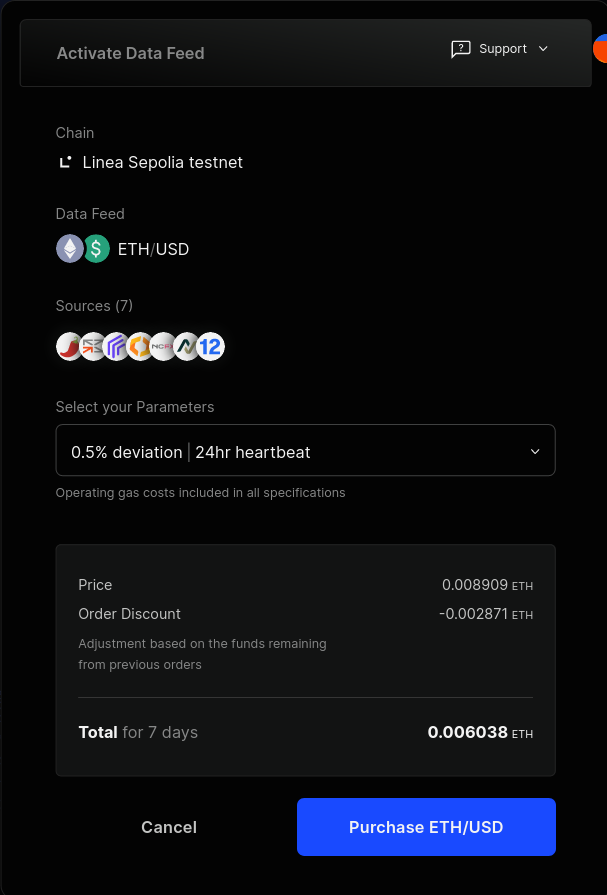
You can then connect your wallet and confirm the transaction. Once it's confirmed, you will be able to see the updated configuration for the dAPI.
Get the proxy address
Once you are done configuring and activating the dAPI, you can now integrate it. To do so, click on the "Integrate" button on the dAPI details page.
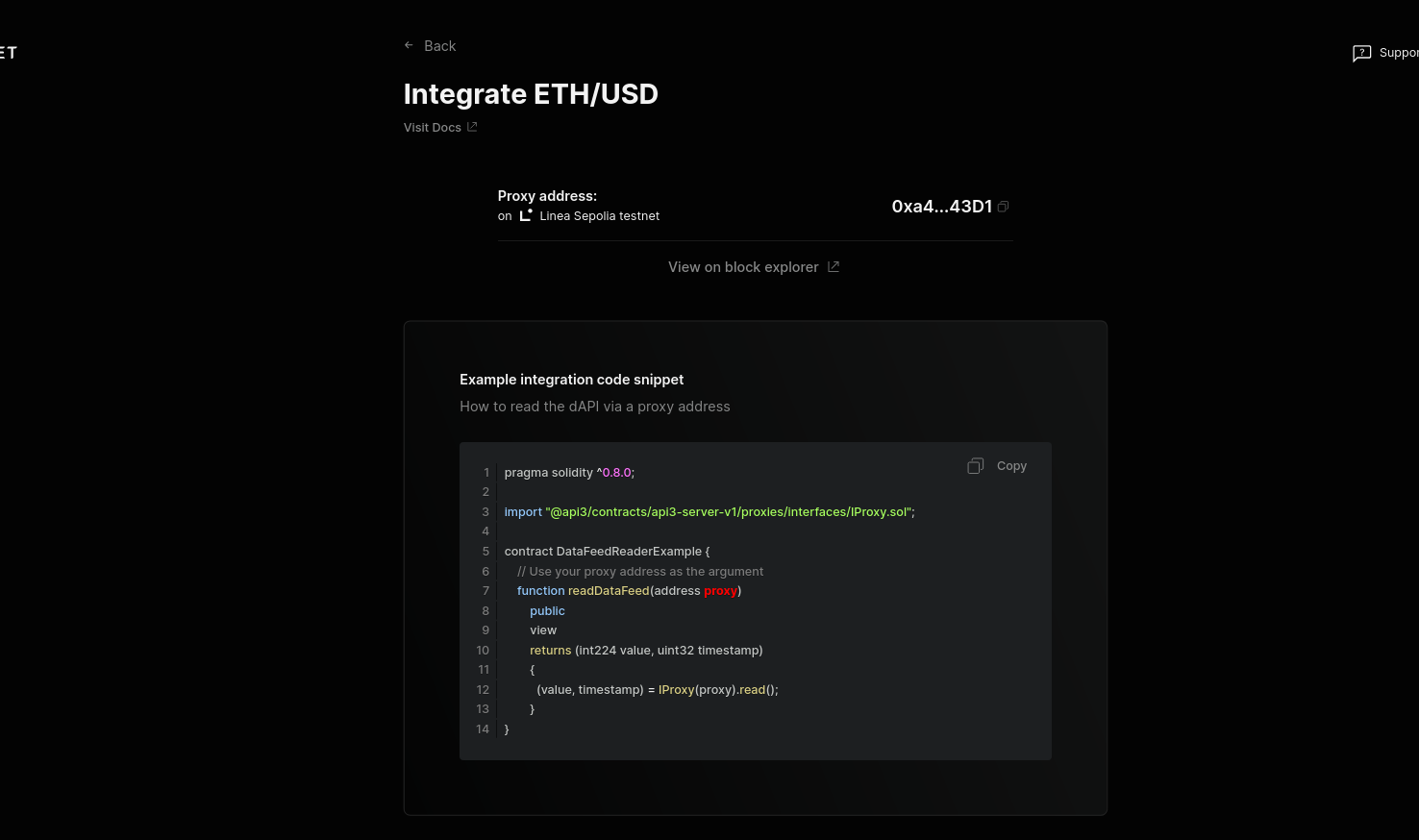
You can now see the deployed proxy contract address. You can now use this to read from the configured dAPI.
Read from a dAPI
Here's an example of a basic contract that reads from a dAPI.
// SPDX-License-Identifier: MIT
pragma solidity 0.8.17;
import "@openzeppelin/contracts@4.9.5/access/Ownable.sol";
import "@api3/contracts/api3-server-v1/proxies/interfaces/IProxy.sol";
contract DataFeedReaderExample is Ownable {
// The proxy contract address obtained from the API3 Market UI.
address public proxyAddress;
// Updating the proxy contract address is a security-critical
// action. In this example, only the owner is allowed to do so.
function setProxyAddress(address _proxyAddress) public onlyOwner {
proxyAddress = _proxyAddress;
}
function readDataFeed()
external
view
returns (int224 value, uint256 timestamp)
{
// Use the IProxy interface to read a dAPI via its proxy contract .
(value, timestamp) = IProxy(proxyAddress).read();
// If you have any assumptions about `value` and `timestamp`,
// make sure to validate them after reading from the proxy.
}
}
-
setProxyAddress()is used to set the address of the dAPI Proxy Contract. -
readDataFeed()is a view function that returns the latest price of the set dAPI.
API3 QRNG
API3 QRNG is a public utility provided with the courtesy of Australian National University (ANU), Quintessence Labs and Quantum Blockchains. It is powered by an Airnode deployed by the QRNG Providers, meaning that it is a first-party service. It is served as a public good and is free of charge (apart from the gas costs), and it provides 'true' quantum randomness via an easy-to-use solution when requiring RNG onchain.
To request randomness onchain, the requester submits a request for a random
number to AirnodeRrpV0. The QRNG Airnode gathers the request from the
AirnodeRrpV0 protocol contract, retrieves the random number offchain, and
sends it back to AirnodeRrpV0. Once received, it performs a callback to the
requester with the random number.
Check out the AirnodeRrpV0
and available QRNG Providers' addresses
on Linea.
Here is an example of a basic QrngRequester that requests a random number:
//SPDX-License-Identifier: MIT
pragma solidity 0.8.9;
import "@api3/airnode-protocol/contracts/rrp/requesters/RrpRequesterV0.sol";
import "@openzeppelin/contracts@4.9.5/access/Ownable.sol";
/// @title Example contract that uses Airnode RRP to access QRNG services
contract QrngExample is RrpRequesterV0, Ownable {
event RequestedUint256(bytes32 indexed requestId);
event ReceivedUint256(bytes32 indexed requestId, uint256 response);
event RequestedUint256Array(bytes32 indexed requestId, uint256 size);
event ReceivedUint256Array(bytes32 indexed requestId, uint256[] response);
event WithdrawalRequested(address indexed airnode, address indexed sponsorWallet);
address public airnode; /// The address of the QRNG Airnode
bytes32 public endpointIdUint256; /// The endpoint ID for requesting a single random number
bytes32 public endpointIdUint256Array; /// The endpoint ID for requesting an array of random numbers
address public sponsorWallet; /// The wallet that will cover the gas costs of the request
uint256 public _qrngUint256; /// The random number returned by the QRNG Airnode
uint256[] public _qrngUint256Array; /// The array of random numbers returned by the QRNG Airnode
mapping(bytes32 => bool) public expectingRequestWithIdToBeFulfilled;
constructor(address _airnodeRrp) RrpRequesterV0(_airnodeRrp) {}
/// @notice Sets the parameters for making requests
function setRequestParameters(
address _airnode,
bytes32 _endpointIdUint256,
bytes32 _endpointIdUint256Array,
address _sponsorWallet
) external {
airnode = _airnode;
endpointIdUint256 = _endpointIdUint256;
endpointIdUint256Array = _endpointIdUint256Array;
sponsorWallet = _sponsorWallet;
}
/// @notice To receive funds from the sponsor wallet and send them to the owner.
receive() external payable {
payable(owner()).transfer(msg.value);
emit WithdrawalRequested(airnode, sponsorWallet);
}
/// @notice Requests a `uint256`
/// @dev This request will be fulfilled by the contract's sponsor wallet,
/// which means spamming it may drain the sponsor wallet.
function makeRequestUint256() external {
bytes32 requestId = airnodeRrp.makeFullRequest(
airnode,
endpointIdUint256,
address(this),
sponsorWallet,
address(this),
this.fulfillUint256.selector,
""
);
expectingRequestWithIdToBeFulfilled[requestId] = true;
emit RequestedUint256(requestId);
}
/// @notice Called by the Airnode through the AirnodeRrp contract to
/// fulfill the request
function fulfillUint256(bytes32 requestId, bytes calldata data)
external
onlyAirnodeRrp
{
require(
expectingRequestWithIdToBeFulfilled[requestId],
"Request ID not known"
);
expectingRequestWithIdToBeFulfilled[requestId] = false;
uint256 qrngUint256 = abi.decode(data, (uint256));
_qrngUint256 = qrngUint256;
// Do what you want with `qrngUint256` here...
emit ReceivedUint256(requestId, qrngUint256);
}
/// @notice Requests a `uint256[]`
/// @param size Size of the requested array
function makeRequestUint256Array(uint256 size) external {
bytes32 requestId = airnodeRrp.makeFullRequest(
airnode,
endpointIdUint256Array,
address(this),
sponsorWallet,
address(this),
this.fulfillUint256Array.selector,
// Using Airnode ABI to encode the parameters
abi.encode(bytes32("1u"), bytes32("size"), size)
);
expectingRequestWithIdToBeFulfilled[requestId] = true;
emit RequestedUint256Array(requestId, size);
}
/// @notice Called by the Airnode through the AirnodeRrp contract to
/// fulfill the request
function fulfillUint256Array(bytes32 requestId, bytes calldata data)
external
onlyAirnodeRrp
{
require(
expectingRequestWithIdToBeFulfilled[requestId],
"Request ID not known"
);
expectingRequestWithIdToBeFulfilled[requestId] = false;
uint256[] memory qrngUint256Array = abi.decode(data, (uint256[]));
// Do what you want with `qrngUint256Array` here...
_qrngUint256Array = qrngUint256Array;
emit ReceivedUint256Array(requestId, qrngUint256Array);
}
/// @notice Getter functions to check the returned value.
function getRandomNumber() public view returns (uint256) {
return _qrngUint256;
}
function getRandomNumberArray() public view returns(uint256[] memory) {
return _qrngUint256Array;
}
/// @notice To withdraw funds from the sponsor wallet to the contract.
function withdraw() external onlyOwner {
airnodeRrp.requestWithdrawal(
airnode,
sponsorWallet
);
}
}
-
The
setRequestParameters()takes inairnode(The Quantum Blockchains/Quintessence Airnode address) ,endpointIdUint256,sponsorWalletand sets these parameters. You can get Airnode address and the endpoint ID here. -
The
makeRequestUint256()function calls theairnodeRrp.makeFullRequest()function of theAirnodeRrpV0.solprotocol contract which adds the request to its storage and returns arequestId. -
The targeted offchain Airnode gathers the request and performs a callback to the requester with the random number.
You can try QRNG on Linea for free. Check out all the QRNG Providers for Linea.
Resources
Here are some additional developer resources:
Have you built a tool for Linea? Contribute to the docs to add it here! See our guide to contributing.